Nobody ever said that having a pet was going to be easy. Sure, on the surface it might seem like you're getting a cuddly new friend who will always be happy to see you, but there's a lot more to taking care of an animal than that.
In fact, when it comes to their health, pets can often present some serious challenges. Whether it's dealing with allergies, keeping them active and healthy, or even just knowing when they're sick, being a pet owner can sometimes feel like a full-time job. But in the end? It's worth it. After all, they are part of the family.
Jump to:
What Is Cat Asthma?

If you've ever seen your cat struggling to breathe, then you know that it is a very frightening thing. It can be even more terrifying if they struggle to breathe and yet appear pain-free. That's why feline asthma also known as feline dyspnea needs immediate veterinary attention, particularly if the cat exhibits any kind of wheezing.
Cat asthma is a respiratory condition where the cat's lungs are blocked by an inflamed airway. It is triggered by several different things, but often it is due to an allergy or sensitivities to something they have inhaled. Cleaning chemicals, cigarette smoke, perfumes and other scented products are just some of the many items that can trigger asthma.
Cat asthma is more than just a respiratory condition. It can also cause several other problems within the body, including congestion, coughing and even cyanosis. While some of these symptoms might sound like colds or allergies in people, cats can experience them differently. For instance, it's not uncommon for cats with cat asthma to go through sudden bouts of sneezing or to develop facial issues, such as runny noses.
What causes asthma in cats?

Cats can develop asthma when certain irritants trigger an allergic reaction that causes their airways to swell. When the tissue in the walls of the cat's bronchial tubes becomes inflamed, it's much harder for them to move air through their system, which makes it difficult for them to breathe. Here are the common causes:
Asthma Triggers in the Home

While some cats are more likely than others to develop asthma, even if you don't think your home contains anything that might set off an allergic reaction within your cat, there could still be some things hidden around that might cause problems. For example, dust mites and mold can trigger feline allergies just as easily as anything else.
Seasonal Allergies
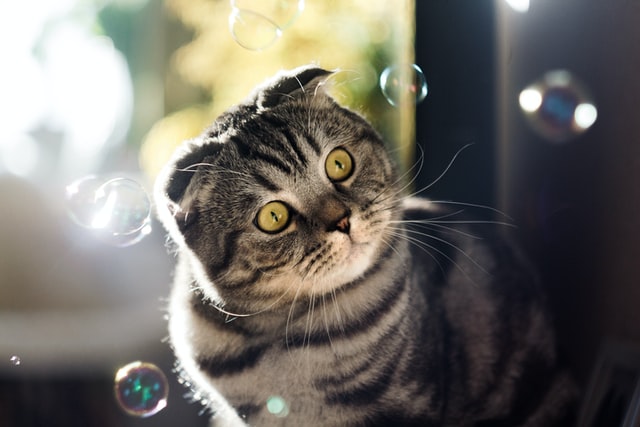
Most cat allergies are triggered by the same kinds of things that affect people, such as pollen and mold. However, you may notice that your cat has asthma symptoms more often during certain times of the year than others. This is because it's also common for pet allergies to be seasonal, usually caused by something that's growing during a certain time of year.
Other Pets in the Home

If you have other pets, it's possible that they could be triggering your cat's asthma symptoms. For example, if you have a dog and a cat who live together, it can be more difficult for your cat to avoid allergens from its canine counterpart. This is especially true if the dog spends most of its time indoors, while the cat only goes outside on occasion.
Obesity
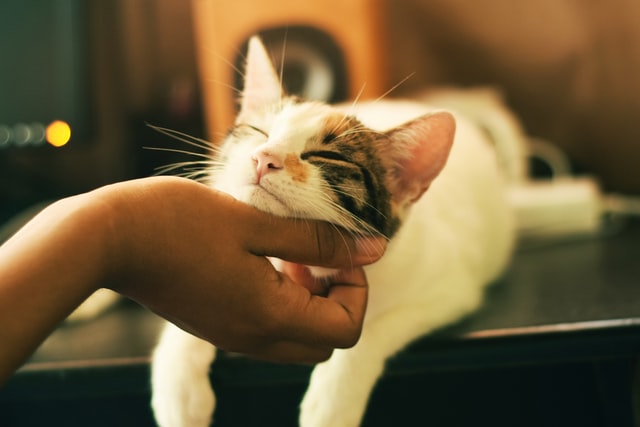
While your cat is more than welcome to indulge in whatever you're eating when they're around, if they become overweight it can cause problems with their throat and airwaves that may contribute to asthma symptoms. This is because fat can build up within the chest cavity, which can restrict a cat's ability to breathe.
How To Tell If Your Cat Has Asthma: The Common Symptoms

If your cat is experiencing any of the symptoms below, it's important to take them to a veterinarian immediately for a check-up. If you suspect that your pet has asthma, but they're not exhibiting any symptoms now, don't wait for their next episode to come around. But as a precaution, here are the following symptoms to look out for:
1. Wheezing or Breathing Problems
Cats who have asthma may experience wheezing when they exhale. In some cases, you might also hear a kind of whistling noise in your cat's ribs when they breathe. These symptoms usually only affect the exhalation process because cats naturally have much smaller airways than people do, which means that they have less space for air to flow through. When the airways are restricted, it can cause wheezing.
2. Unusual Vocalization
Cats that exhibit unusual vocalizations like meowing and crying may be trying to communicate an issue with their respiratory system. Since cats cannot talk, making noises is one way that they communicate their pain, discomfort, or distress.
3. Congestion and Sneezing
When a cat has an upper respiratory infection, it may display symptoms of congestion and sneezing. When the tissue in the walls of the cat's airways become irritated from an allergic reaction or infection, it can make it more difficult for them to breathe. Therefore, your cat may sneeze, cough, or produce a lot of mucus when they have asthma.
4. Lethargy and Increased Sleep
Low energy levels can be an indicator that something isn't quite right with your cat's respiratory system. If you notice that your pet has decreased their activity level significantly, it may be a sign that they're feeling tired and weak because they can't breathe as well as they should.
Also, if your cat has been sleeping more than normal, especially during the day or when you're trying to play with them, it may be an indication that their asthma is acting up again.
5. Loss of Appetite

Anorexia, or loss of appetite, can be an indicator that there's something wrong with your cat's respiratory system. If your pet is not eating as much as they usually do, it may be because eating makes them struggle to breathe properly.
6. Weight Loss
cats that are suffering from asthma often lose weight because their condition prevents them from eating as much or exercising as much. When your cat's respiratory system isn't working properly, it may cause them to become malnourished and lose weight despite their best efforts to eat well.
7. Bluish Coloration of the Oral Mucosa
When your cat is having difficulty breathing due to asthma symptoms, it may exhibit a bluish colouration of the oral mucosa. This happens when their respiratory rate is elevated and they're trying to draw more oxygen into their lungs, but because of their condition, they can't get enough air in.
8. Retractions
When a cat has difficulty breathing, you may notice that its chest area is making unusual movements. Retractions occur when the muscles surrounding the ribs contract and pull them inward to make room for the lungs. This movement makes it possible for cats to breathe, but if your pet i's experiencing coughing fits, it may be a sign that they're suffering from asthma.
9. Inactivity
Cats with feline asthma often display decreased activity levels because even the slightest of movements can make breathing difficult for them. If your cat is no longer as active as usual or if they're sleeping more than usual, it's as trying to compensate for obstruction or blockage in their airway.
10. Rolled Up Tongue
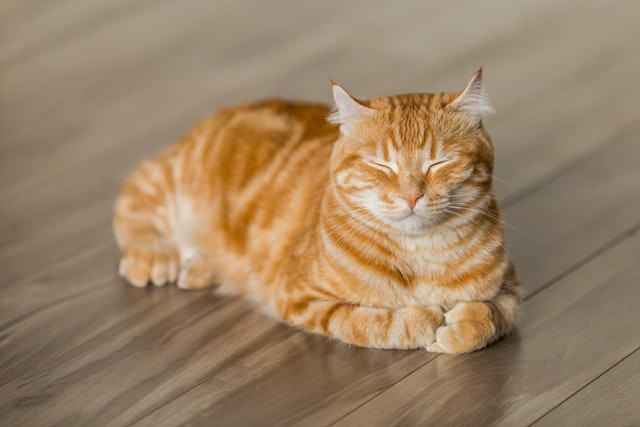
When your cat is having difficulty breathing because of asthma, it may have a rolled-up tongue. This happens when the muscles in their tongue are contracted to make it shorter so that they can take bigger breaths easier by pulling the tongue back to open the mouth, which makes it possible for more air to enter the respiratory system.
11. Upper Airway Resistance Syndrome (UARS)
Some cats who suffer from asthma may exhibit signs of Upper Airway Resistance Syndrome (UARS). With this condition, their airways narrow when they inhale, which means that it takes more effort for them to breathe. This can lead to many of the same symptoms displayed by cats with asthma, such as the ones listed above.
12. Discharge from Nostrils
Another indication that your cat may be suffering from feline asthma is if they're experiencing discharge from their nostrils. Their respiratory system can cause mucus and fluids to build up and drip out of your pet's nose because their airways are irritated and inflamed.
13. Difficulty Swallowing
Coughing or sneezing can cause a cat to have difficulty swallowing because it basically forces the food in their throat backwards, which makes it more difficult for them to eat. When cats suffer from allergies, they may also display this symptom because of an irritated respiratory system.
14. Snorting
Snorting is another indication that your cat is having breathing problems. Snorting occurs when air enters the nose and causes your pet to snort, which happens because their nasal passages are restricted due to asthma symptoms.
15. Hacking
Since asthma causes cats to have difficulty breathing, they may start hacking because their respiratory rate is elevated and they're trying to remove irritants in their respiratory system. Hacking can also occur when cats are recovering from an asthma attack or if they've been barking or meowing for a long period of time because it causes them to overheat.
16. Porphyrin Discharge from Eyes
Cats with asthma often have porphyrin discharge from their eyes because their respiratory rate is so high that it causes their eye tissue to swell. When this occurs, the blood in these areas becomes visible when it oozes out of your cat's tear ducts.
17. Dyspnea
Your cat may also experience dyspnea, which is a medical term that means they're having trouble breathing. Dyspnea causes cats to breathe irregularly and be unable to catch their breath, especially if it's severe. This may cause them to inhale deeply or pant, which can make it even harder for your pet to take in enough air and maintain an appropriate respiratory rate.
18. Mouth Breathing
Cats with asthma may also breathe through their mouth if their nostrils become irritated or inflamed, which makes it even more difficult for them to take in enough air. Mouth breathing can be a sign that your pet is having an asthma attack or that their respiratory rate has been elevated for a prolonged period, such as when they're meowing or barking.
19. Coughing
If your cat is coughing, it could be a sign that they're suffering from feline asthma. Cats typically do not cough unless something is irritating their throat or airways, but some may start hacking sometimes if they have difficulty breathing because the airways are becoming restricted.
Inside of a cat's respiratory system are small tubes called bronchi, and the airways leading to them are called bronchioles. When cats develop asthma, these areas become inflamed and narrowed because of excess mucus production, which makes it harder for your pet to provoke their cough reflex.
Cat Asthma: Traditional and New Treatments

Treating cat asthma is a difficult task. There are many types of asthma that can affect cats, and some breeds such as the Siamese tend to be more susceptible than others. The severity of an attack will often determine what treatments your cat receives, but here are the common treatments for cat asthma below:
1. Steroids
Steroids are often used to treat feline asthma, especially when it's more severe. When your cat is suffering from an attack, they may receive steroid injections or be prescribed oral steroids. While steroids are effective in the short term because they reduce inflammation, they can have serious side effects if taken for too long.
2. Antihistamines
When cats are having an asthma attack, they may be prescribed antihistamines. These medications block histamine, which is the chemical that causes inflammation and irritation. Your cat will typically receive these injections when they're experiencing more severe symptoms.
3. Bronchodilators
Bronchodilators open airways in cats who are having an asthma attack. They're used commonly when symptoms are more severe, and they open airways by relaxing the smooth muscles surrounding them. Bronchodilators may be given through injections or orally in the form of tablets, but they must be used when symptoms arise because they become ineffective if your pet is taking them daily.
4. Omega-3 Fatty Acids
Omega-3 fatty acids are essential for cats with asthma because they reduce inflammation and enhance the immune system. They're typically given orally in the form of fish oil capsules and can be highly beneficial when treating cat asthma because they're natural and won't cause your pet any side effects. Omega-3 fatty acids can also be used to treat other inflammatory diseases in cats.
5. Acupuncture
Acupuncture is a type of treatment that uses various sharp needles to stimulate specific points on your cat's body. It sends electrical impulses through the needles, which cause an increase in the secretion of pain-relieving hormones. This reduces stress and muscle spasms in cats who are having an asthma attack, and it works in the same way as bronchodilators.
6. Homeopathic Treatments
Because there are several types of cat asthma, some may require homoeopathic treatment instead of traditional medications. Your veterinarian will be able to determine whether your pet's case is mild enough that it can be treated with natural medicines.
7. Medical Marijuana
Like humans, cats can also benefit from medical marijuana because it reduces inflammation and slows muscle spasms. It's used to treat cat asthma when other medications are no longer effective or if your pet cannot tolerate them. You should speak with a veterinarian about the best product for your cat before giving them any medication and if they are legally allowed in your country, as well as how much to give them.
8. Surgery
If your cat is having frequent asthma attacks, your vet may recommend surgery for their trachea, also known as the windpipe. The procedure involves widening it so that air can flow through more freely. However, there are risks involved with anaesthesia and infection of the incision site.
9. Environmental Modification
When your cat is ill, you should consider whether its environment may be contributing to the problem. For example, keeping your pet in a confined space with minimal ventilation can affect their respiratory health. Also, try to keep them away from any household chemicals or aerosols that have been sprayed. If these steps don't work, you should consider moving to another house or even another part of the country to see if that helps.
10. Humidifier
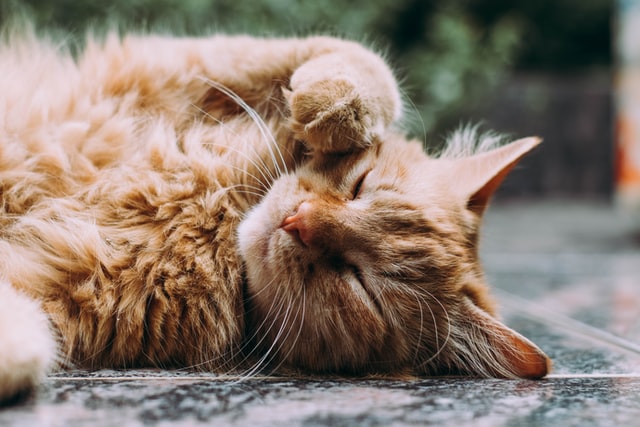
Cats with asthma may benefit from a humidifier because it moisturizes the air they're breathing, which reduces irritation and swelling in their respiratory tract. It can also help them sleep more comfortably at night. If your cat does have an asthma attack, you should set up the humidifier before anything else.
11. Acupressure and Pressure Points
You should also speak with a vet about acupressure and pressure points that can be safely used to relieve your pet's symptoms. This may not be suitable for all cases of asthma, but it can be very effective for some.
12. Asthma Medication
There are various asthma medications that may help your cat, but it's important to speak with a vet first to see if they're suitable for your pet. Some medications used for cats have the same effects as human medications, and those should never be given to them.
13. Drink Plenty of Fluids
Cats are known for being independent creatures, but you should encourage them to drink more water so that they don't get dehydrated. Dehydration can reduce the amount of oxygen in your pet's blood because it causes their respiratory tract to dry out and become inflamed. Therefore, dehydration is so dangerous for asthmatic cats because it can prevent their bodies from getting enough oxygen.
14. Be Patient
Treating cat asthma isn't an overnight process, so you need to be patient with your pet and stick with the treatment they're given even if it doesn't seem to be working initially. It may take several weeks or months before you start to notice a difference in your pet's health.
15. Use Probiotics
Probiotics are beneficial bacteria that can reduce the risk of asthma because they fight off negative bacteria, parasites, and viruses. They may also prevent inflammation in your cat's respiratory tract, which makes it easier for them to breathe normally. Probiotics are present in yoghurt, so try feeding your pet some every day to increase their intake of these beneficial bacteria.
16. Vitamins and Supplements
Your vet may recommend vitamin supplements if your cat is deficient in certain vitamins that can worsen asthma symptoms. They may also suggest omega fatty acid supplements because they fight inflammation and promote healthy respiratory function.
17. Spaying or Neutering your Cat
Spaying, or neutering, your cat may reduce the number of asthma attacks because there are fewer hormones in their system to trigger an attack. If you have just one pet, it could also stop them from being stressed out about mating which can provoke an attack.
18. Keep Kitty Litter Boxes Clean
If you have more than one cat, it's important to keep their litter boxes clean because dirty boxes can cause irritation in their respiratory tract. This is another example of how the environment your pet lives in may be contributing to their asthma, so you should try to improve conditions for them.
19. Allergens
Cats are not generally allergic to the same allergens as people, but there are a few substances they can be sensitive to. These may include wool, tobacco smoke, and dust from hay or straw. You should avoid having these substances in your home if you have asthmatic cats because they can provoke an attack. However, it's also a good idea to avoid these things if you don't have asthmatic cats because they can irritate your respiratory tract too.
20. Avoid Other Pets and Allergens
If your cat is suffering from allergies that aren't asthma, then there are certain animals and substances that should be avoided for this reason. Dogs and other types of pets will make an allergic cat's symptoms worse, and you should avoid having smoke from fireplaces and candles in your home too.
21. Don't Smoke
Cats who live with people who smoke are more likely to develop asthma because it irritates their respiratory tract, so you should encourage everyone in the household, not to smoke. Second-hand smoke can also affect other pets, so it's important to avoid having cigarettes in your house even if you don't have asthmatic cats.
22. Make Sure Kitty Doesn't Lick or Chew at Themselves
If your cat licks and chews at their fur, they could swallow allergens that enter their system and trigger an attack. This is another reason why it's important to keep your pet away from smoke, stuffed animals, wool, etc.
23. Keep Kitty in a Stress-Free Environment
Stress can make asthma worse for cats because it causes them to produce more adrenaline which constricts their airways when they're in danger. You should try to keep your pet away from stressful situations, but this isn't always possible. One way to cope with stress is by providing them with an area where they can go to relax alone.
Other Treatments

Other treatments that may be used to treat cat asthma include the use of vaporizers, allergy testing, and surgery. Vaporizers are commonly used in mild cases because they work by breaking up mucus clogged in your pet's airways. Allergy testing is necessary for cats who are suffering from unknown triggers, and surgery may be used to remove tumors or scar tissue that is restricting airflow.
When To Take Your Cat To A Vet

If your cat is suffering from any of the asthmatic symptoms listed above, it's important to take them to a veterinarian so you can get a proper diagnosis and treatment plan. You should also talk to your vet if your cat seems lethargic or their appetite isn't what it normally is when they have been displaying asthma symptoms for more than a week.
If you're new to having a cat and they start showing these symptoms, then it may not be asthma and your vet will help determine what is wrong with them.
FAQs
How is cat asthma diagnosed?

It can be difficult to diagnose asthma in cats because similar symptoms can point to other respiratory conditions. Your veterinarian will need to pinpoint the cause before making a diagnosis. To do so, they'll need to know about your cat's medical history and conduct a thorough physical exam.
This will involve listening closely for any wheezing sounds? using a stethoscope? and checking your cat's coat for any signs of dander or excess shedding. Your veterinarian might also recommend some diagnostic tests, such as x-rays or blood tests.
Are some cats more likely to get asthma?
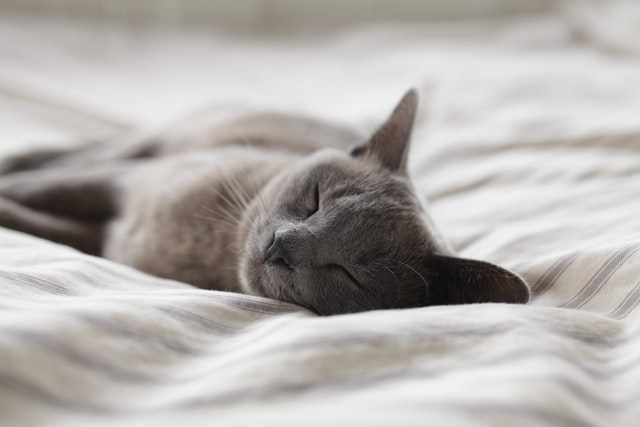
Some asthmatics are more likely to develop the condition than others. Cats who live with smokers or in homes where there is a lot of dust and pollen are more likely to get asthma because these allergens trigger attacks. Cats diagnosed with feline leukaemia virus (FeLV) and FIV may also be at increased risk.
What Is The Life Expectancy Of Cats With Asthma?

Living with asthma can be frustrating for cats because it makes them prone to attacks, but the condition doesn't shorten their life expectancy. If your cat is diagnosed early and their symptoms are well controlled, then they'll live a long and healthy life like other pets.
Conclusion

Cat asthma is a frustrating condition because it makes your pet more susceptible to attacks, but you can help them cope with the symptoms. The best way to do this is by keeping allergens away from their airways and providing them with a stress-free environment.
If your cat starts displaying symptoms of asthma, then contact your veterinarian as soon as possible because it can be difficult to diagnose. Otherwise, you should expect your pet will live a long and happy life just like other pets that suffer from asthma.




